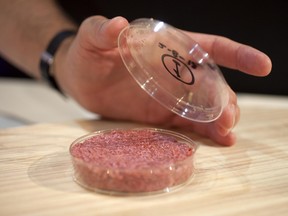Meat Processing Phone Answering Funny Quotes
Daniel Engber: This pseudo-burger just won't wing
The case against fake meat

"I was expecting the texture to be more soft," said nutrient scientist Hanni Ruetzler upon tasting the world'southward first lab-grown hamburger at Mon's press consequence in London. "Information technology's close to meat, but information technology'south non that juicy." After years of research and development — and an investment of $330,000 — the Netherlands-based tissue engineer Mark Post served up a patty of pure moo-cow musculus, reared from stem cells in a dish. Ruetzler, one of the two people who were immune to sample it, declared the synthetic burger "crunchy and hot," and "a bit similar cake."
This was just a proof of concept — a way for Post to evidence that constructed meat is even possible at all. The London burger had no fatty cells whatsoever, so it couldn't taste that much similar carcass beefiness, but time to come versions will be marbled in the lab: It's merely a thing of refining the technology, and scaling up the meat vats for industrial production. Postal service expects to have a feasible alternative for subcontract-raised cattle on the market in the adjacent 10 to 20 years.
If lab meat takes off, we might scale back the impairment done past the huge and growing livestock industry. Nutrient animals business relationship for at least one-sixth of the world's greenhouse-gas emissions, and demand for meat is growing. (Some look information technology to double past the year 2050.) Growing beefiness or chicken in laboratory vats could also save trillions — trillions — of animal lives within a couple of decades.
That's why I'm sorry to say that this well-intentioned project is such a waste of time. In fact, information technology's one of the worst good ideas of recent retention.
What'south wrong with Frankenbeef?
Marker Postal service and his financial backer — Google co-founder Sergey Brin — say that test-tube beef, a product fabricated of moo-cow cells, could be the beef stand-in that we demand. Since it comes from real animal materials, it won't suffer the fate of soy- and fungus-based alternatives. (Despite decades of industrial research, the veggie "meats" y'all find in grocery stores — Gardenburgers, Tofurkey, etc. — are only rough approximations. They're false. Lab-fabricated meat, on the other hand, is real.)
I don't buy it. If Mon'due south demonstration showed us anything at all, it'due south that "real" meat won't necessarily taste like a piece of muscle from a cow. Marking Mail service'south proof of concept started yellow-white, so he colored it with beet juice, caramel and saffron. If it'south to exist sold at Burger King or Milk shake Shack, more fixes will exist necessary.
In other words, laboratory meat only seems "real" — it only matches up with the taste yous know and love — when mixed with additives to meliorate its color, flavor, and mouthfeel. But if that's truthful, then what's the point? Does a base of cultured moo-cow cells really get u.s.a. whatever closer to a perfect substitute for flesh than soy or wheat or mushroom?
Information technology's truthful that scientists can make synthetic versions of natural products—much of the vanilla season in our nutrient supply, for case, comes non from the vanilla orchid but a process of industrial fermentation. (Either way, the ingredient tastes pretty much the aforementioned.) Meat is a far more complicated substance, though — a mix of musculus, fatty, tendons, ligaments, and blood — and ane that doesn't lend itself to "nature-identical" formulations.
Meanwhile, food activists have shown a trend to attack whatever laboratory production, no matter how scrumptious or salubrious, on the grounds that it might cause allergies or cancer. Even now, the Center for Science in the Public Interest wants the FDA to look into a ban on the sale of Quorn, the mucus-based meat substitute, despite piddling evidence of harm in more 20 years of use.
In the end, it doesn't affair if synthetic beef is made from musculus cells. Meat is more only a set up of tissue types, and something else beyond their flavor. It's a slice and product of the civilization, a thing that tin can't be faked.
Slate.com
Source: https://nationalpost.com/opinion/daniel-engber-this-pseudo-burger-just-wont-fly
